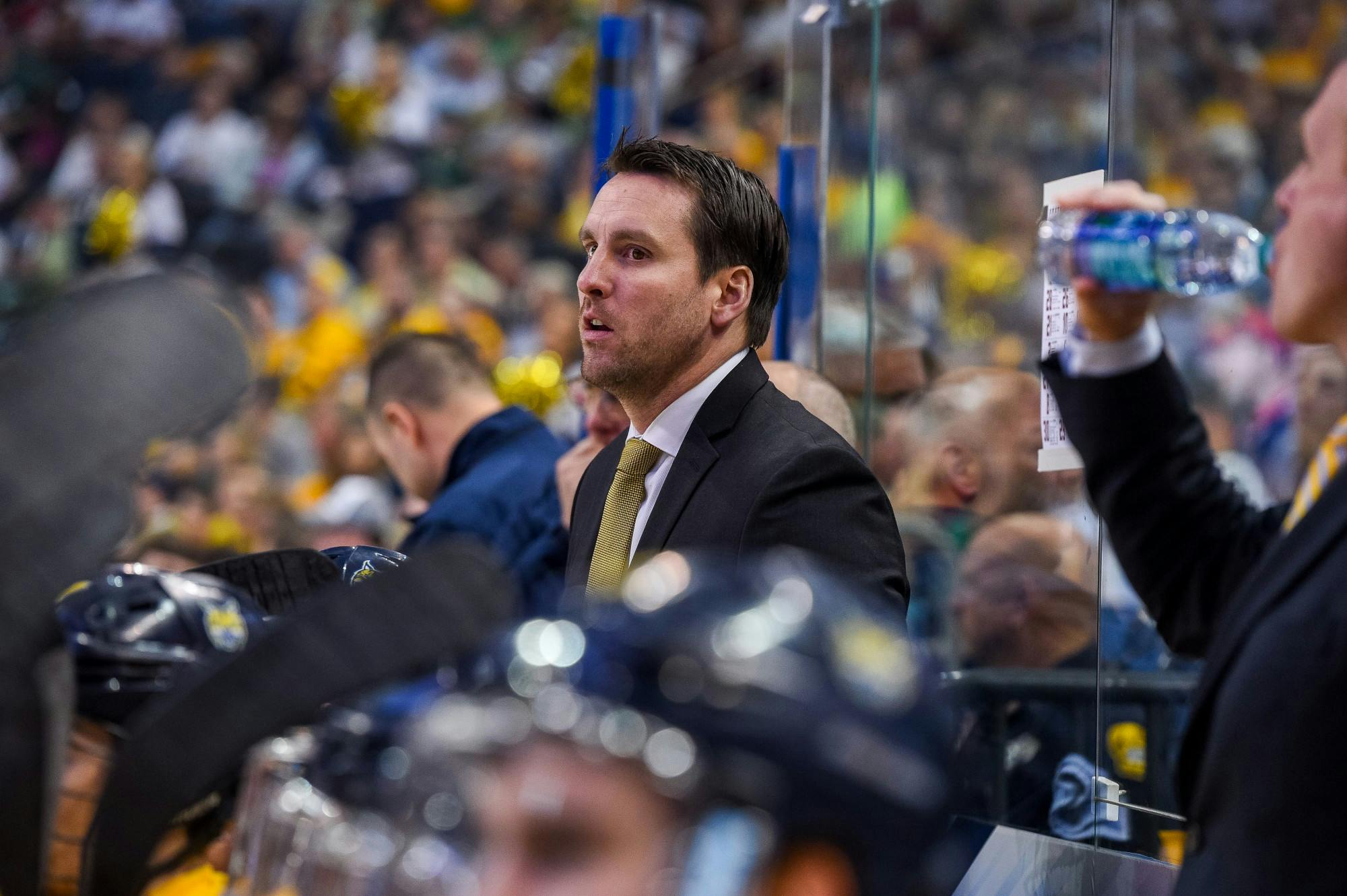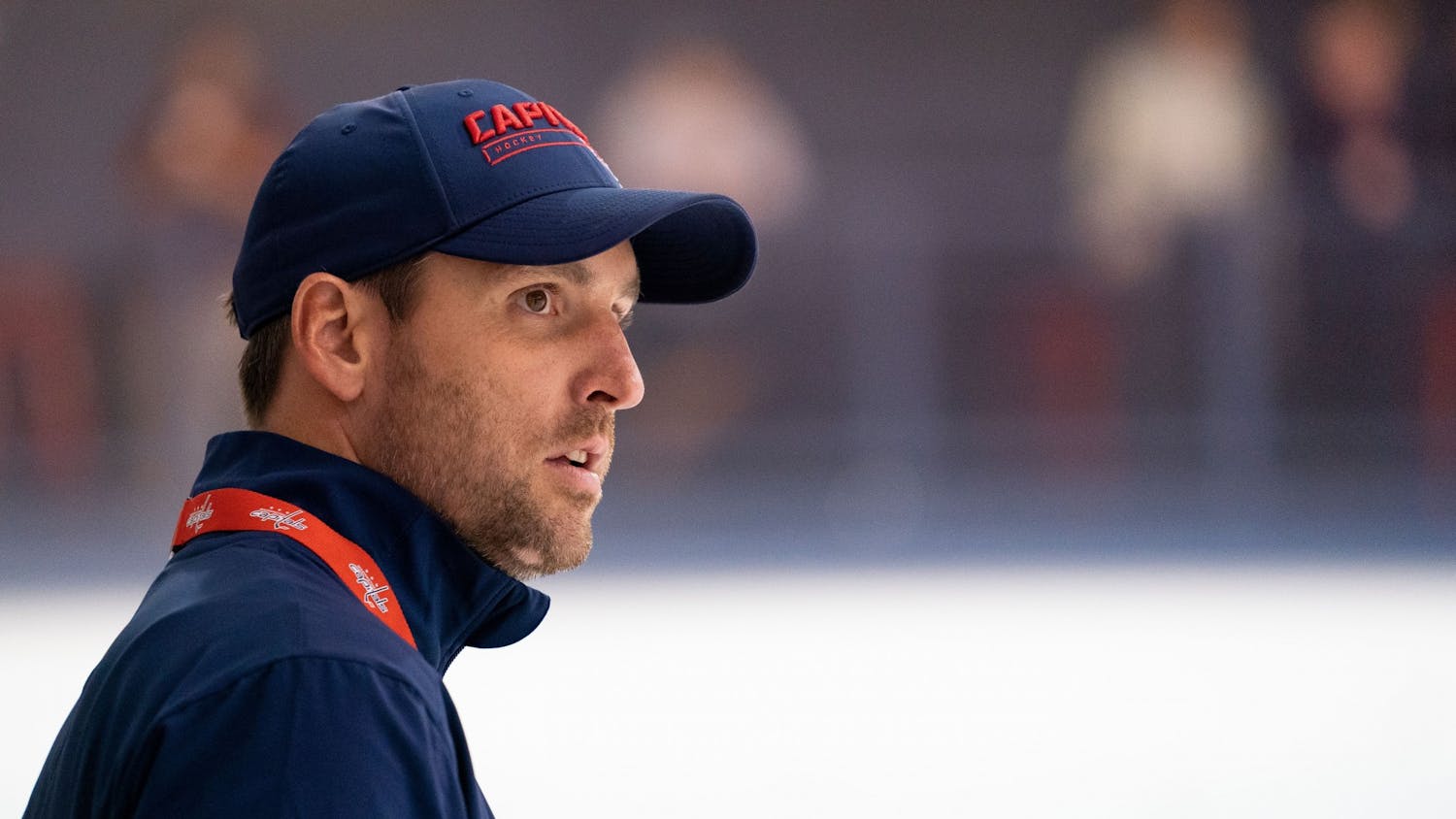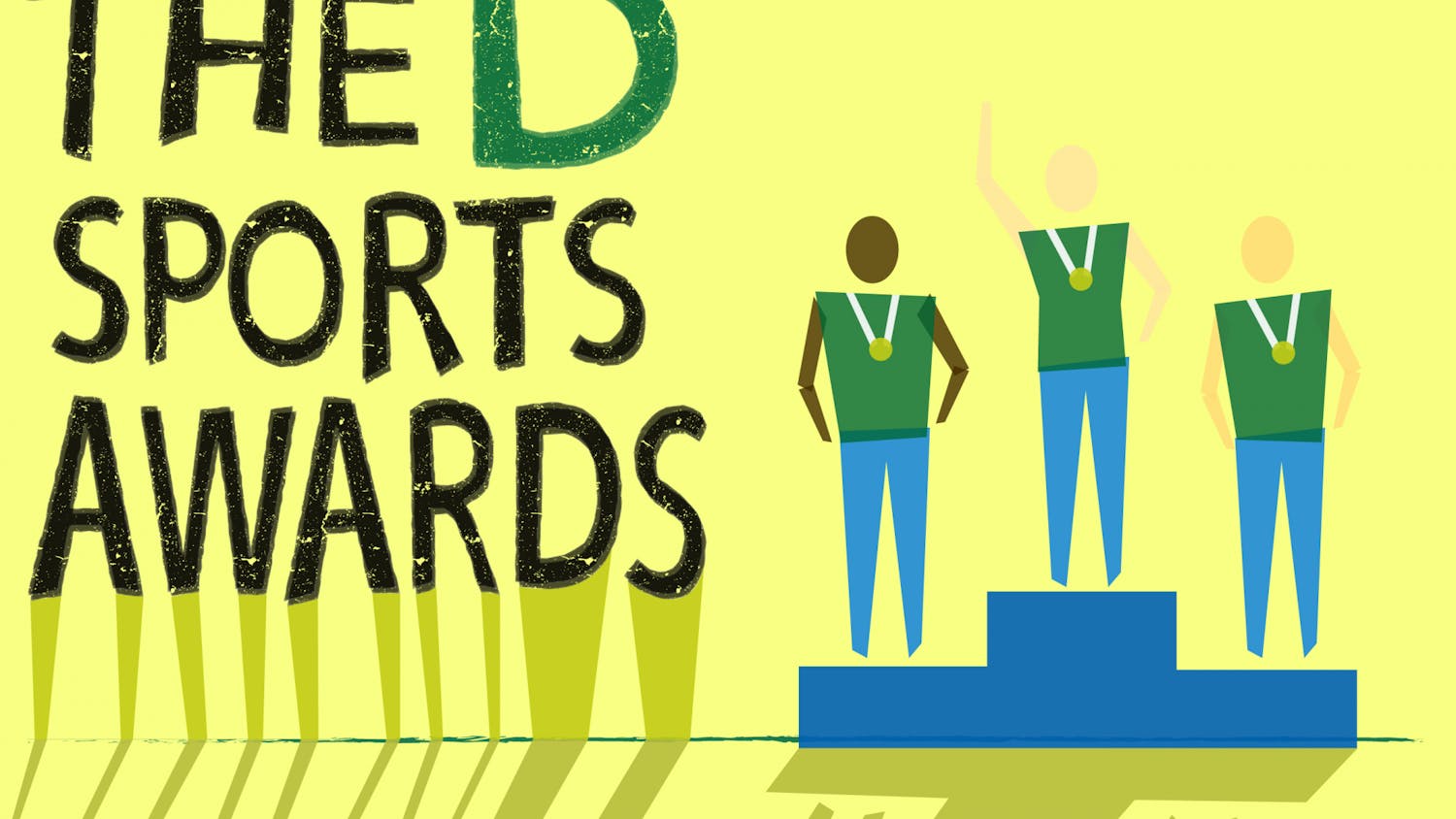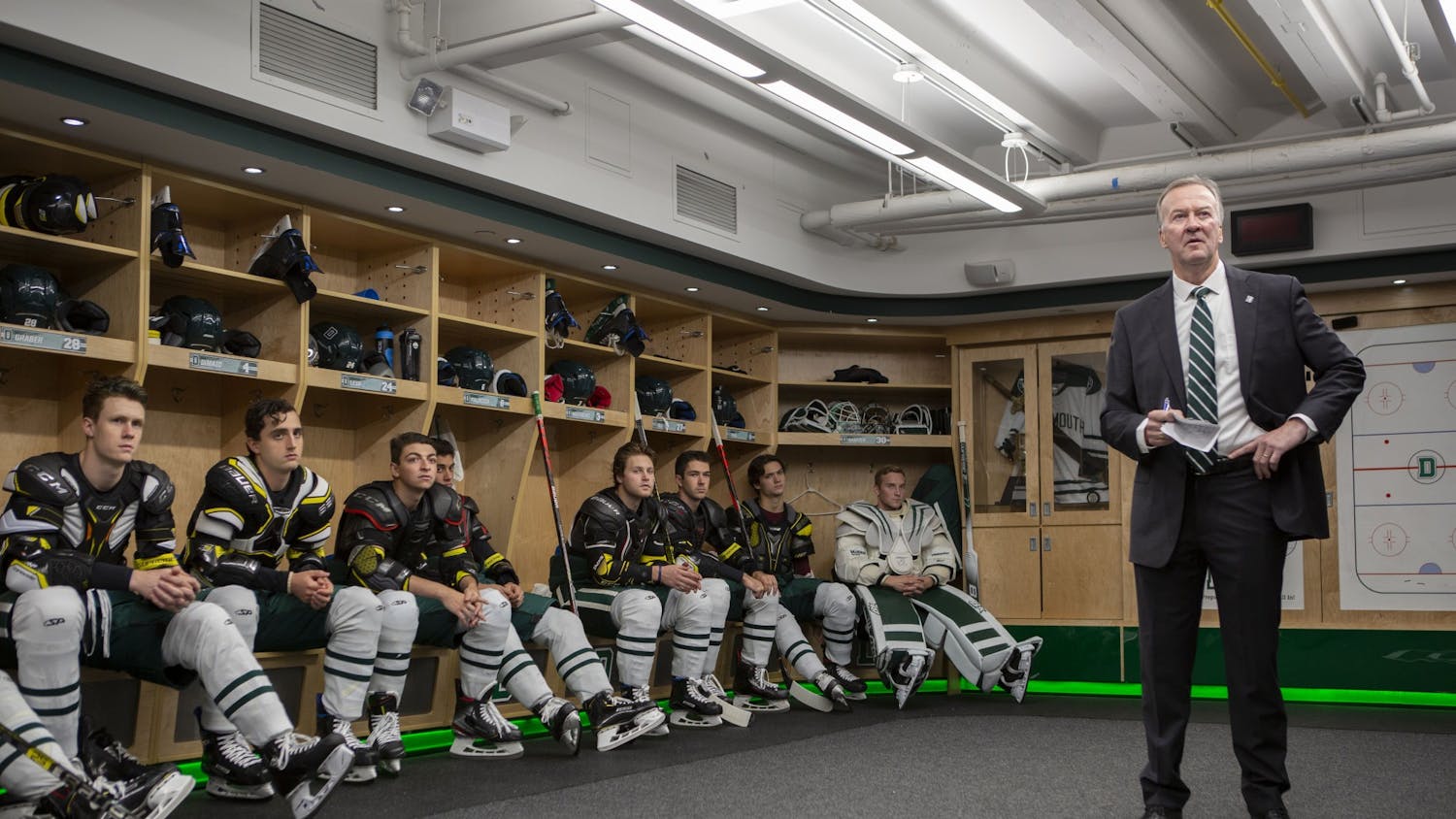After longtime coach Bob Gaudet ’81 stepped down from his 23-year post with the Big Green men’s hockey team, many were quick to note that the new coaching staff had “big skates to fill,” to say the least. On June 1, athletics director Harry Sheehy announced that Reid Cashman, former star Quinnipiac University defenseman and Washington Capitals assistant coach, would be stepping into those skates.
With a new coaching staff at the helm and an impending season that will look drastically different from normal due to the COVID-19 pandemic, Cashman will be leading the Big Green into uncharted territory. His team will be tasked with adapting to a change in coaching staff and forming new relationships in an already tumultuous time. All the coaches and players have been working to begin strengthening these connections in preparation for a potential season in January.
“I’ve talked to all of [the new coaches] individually a decent amount … they've been great so far when checking in personally,” Sam Hesler ’22 said. “It’s different to not have your first real introduction be in person, I wish it were that way, but they've done as much as they possibly can to sort of reach out individually and connect with us beforehand, which has been very nice.”
Going into a season chock full of unknowns with question marks lining the pages for coaches and players alike, Cashman is focused on coach-player relationships and making the most out of an incredibly difficult and unpredictable situation.
“There has to be trust,” Cashman said. “I have to earn their trust and vice versa. I think when you have trust, that allows our staff to really challenge them and know that when we're challenging them. It comes from a place of love and wanting to maximize who they are as athletes inside the rink and then as young men outside the rink.”
With a shining resume and a lifetime of hockey under his belt, Cashman’s hockey expertise is hardly in question. As both a player and a coach, Cashman has racked up a laundry list of accolades and achievements.
Growing up with two older brothers in Minnesota, Cashman “didn’t really have a choice” as to whether or not to play hockey. Learning to skate from his mother on a small pond in the neighborhood, Cashman went on to play high school hockey before playing junior hockey in the United States Hockey League for the Waterloo Blackhawks.
During his time with the Blackhawks, Cashman earned a scholarship to play for Quinnipiac, where he was a leading defenseman all four years. He also earned all-league honors all four years, first in the Atlantic Hockey Association and then in the Eastern College Athletic Conference after Quinnipiac switched conferences. In only his second year, he led the Atlantic conference with 45 points (13 goals, 32 assists) and was named the team’s first Division 1 All-American, a finalist for the Hobey Baker Memorial Award and Atlantic Hockey Player of the Year. Cashman led the team as a repeat captain during his last two seasons, and became the school’s all-time leader in both games played and assists; he still holds both those records. On the ECAC’s fiftieth anniversary in 2011, Cashman was named one of the top 50 players in all ECAC history.
Upon his graduation in 2007, Cashman signed a one year, entry-level contract with the NHL’s Toronto Maple Leafs, and played with various AHL teams for the next four years. Cashman headed back to Hamden after his former Quinnipiac coach, Rand Pecknold, gave him an opportunity to begin coaching at the Division 1 level.
“I thought I'd be a teacher when I was out of college,” Cashman said. “But once I kept playing, I knew I wanted to coach, which to me is the same thing: you’re a coach, you’re a teacher and vice versa.”
In Cashman’s five seasons coaching at his alma mater, he brought the Bobcats to the NCAA tournament four times. Two of those times, in 2013 and 2016, the team reached the Frozen Four and finished as the national runner-up. During Cashman’s tenure as assistant coach, the Quinnipiac team boasted top figures in penalty kills and power plays, in addition to the second most wins in the nation.
After a successful run as a collegiate-level coach, Cashman took an assistant coaching job with the Washington Capitals’ AHL affiliate, the Hershey Bears, before spending the past two seasons behind the bench for the Capitals. With the Capitals, Cashman worked with the defense and on the team’s penalty kill. Cashman was also responsible for player development through the Capitals’ development camps and recruiting and assembling the team’s staff.
Cashman is currently in Toronto with the Caps for the postseason, but will be moving up to Hanover with his wife and two daughters at the close of the team’s time in the tournament.
“I’m extremely excited — my family is extremely excited [about moving to New Hampshire],” said Cashman. “We’ve hired Jason Tapp, Stavros Pascaris and been able to keep on Brian Corcoran, and those three guys have done a tremendous job of getting going with recruiting and looking to build our team and build relationships with our current players. They're really kind of the boots on the ground [and] are helping with the transition today until I can get down to campus.”
While Cashman has not been able to meet the Dartmouth hockey team in person yet, players have been able to catch a glimpse of what playing for Cashman might be like throughout the summer through individual and team Zoom calls.
“From the start he’s been very transparent about what he does and doesn’t know. He’s also emphasized controlling what you can control,” Brendan Less ’21 said. “This isn't a normal situation, so we have to get used to it. It's going to be a weird year. And the sooner we get comfortable with that reality, the better off we’ll be.”
Despite the nontraditional introduction to their new head coach, players are eager to begin learning and skating with him.
“Quinnipiac is very well known for having a really good special teams system so that'll be nice to draw from,” Hesler said. “I think most importantly, he’s been with the Capitals for the last two years. Having that behind the scenes look into some of the best players in the world and how he's been working with them I think will translate well, and he'll be able to give us some pretty invaluable lessons when he's behind the bench. I'm looking forward to being with and meeting the new coaches, [and] just having a fresh set of eyes and a motivating factor to have to prove yourself right off the bat.”




